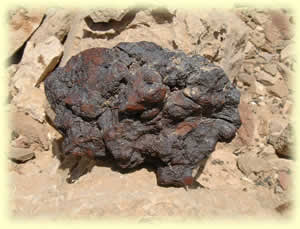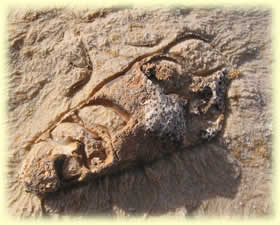|

Anyone visiting jebel Rawdah can hardly fail to notice the unusual
rock specimens scattered around. I decided to do a bit of rooting
around for information on the local geology and this is what I found.
 If
you examine the rocks in the Jebel Rawdah area, you'll find mainly
weathered limestones and an abundance of marine fossils. Nothing
out of the ordinary there, but what is unusual is the dark maroon
rock that sticks out like a sore thumb amongst the pale sandy colours
of the limestones. On a recent trip some people thought that this
rock might be from a metoerite, and it certainly does appear quite
alien when compared to its surroundings. If
you examine the rocks in the Jebel Rawdah area, you'll find mainly
weathered limestones and an abundance of marine fossils. Nothing
out of the ordinary there, but what is unusual is the dark maroon
rock that sticks out like a sore thumb amongst the pale sandy colours
of the limestones. On a recent trip some people thought that this
rock might be from a metoerite, and it certainly does appear quite
alien when compared to its surroundings.
Imagine a chunk of molten dark red coloured plastic that has cooled,
and you'll have some idea of the appearance. These rocks are officially
known as Semail Opheolite and originate from material forced up
from deep within the earth's crust as a result of plate collision
around 70 million year ago.
This rock formed islands in a shallow warm sea, the limestone was
formed around the islands and the marine fossils were deposited
within this. The Ophiolite outcrop makes the geology of Jebel Rawdah
quite striking. 
Also of interest is the reddish rock band that you can see in the
'one-tree gully' area, and if you look up from the wadi campsite
you can trace one of the rock layers which appears to have more
plants growing along it than the others. Follow the rock band along
the hillside and count just how many plants (caper plants mainly)
are growing along it. Is this due to the nature of the soil along
this band or is it due to there being more water available due to
the band's impermiability?
Return to text
© Roy L Richards 2012
Contact for problems, queries etc:
|





